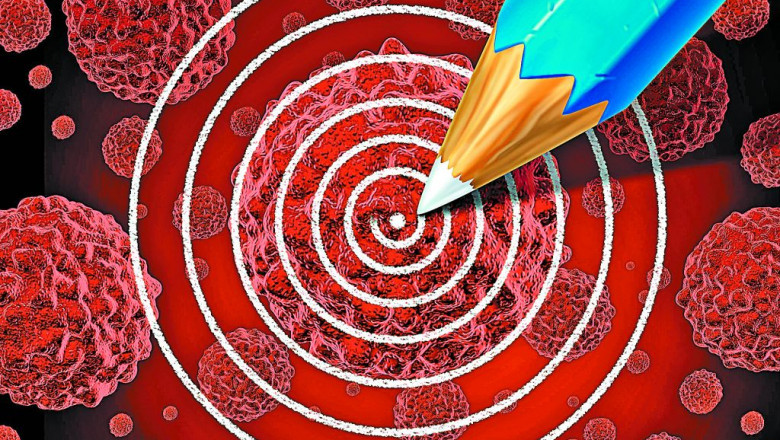views
Understanding the Basics of Targeted Cancer Therapies
Targeted cancer therapies are a revolutionary approach to treating cancer that focuses on specific molecules involved in the growth, progression, and spread of cancer cells. Unlike traditional chemotherapy, which broadly attacks both cancerous and healthy cells, targeted therapies are designed to selectively target cancer cells while minimizing damage to normal tissues. This precision medicine approach has gained significant attention in recent years due to its potential to improve treatment outcomes and reduce side effects.
Targeted Cancer Therapies work by interfering with specific molecules or pathways that are crucial for cancer cell survival and proliferation. These molecules, known as molecular targets, are often mutated or overexpressed in cancer cells compared to normal cells. By targeting these unique characteristics of cancer cells, targeted therapies can effectively inhibit tumor growth and progression while sparing healthy tissues.
Types of Targeted Cancer Therapies
There are several types of targeted cancer therapies, each designed to target specific molecular pathways or cellular processes. Some of the most common types include:
1. Small molecule inhibitors: These are small chemical compounds that can penetrate cancer cells and interfere with specific enzymes or proteins involved in cancer growth and survival. Examples include tyrosine kinase inhibitors (TKIs) and PARP inhibitors.
2. Monoclonal antibodies: These are laboratory-produced antibodies that are designed to recognize and bind to specific proteins on the surface of cancer cells. By attaching to these proteins, monoclonal antibodies can disrupt cancer cell signaling, induce an immune response, or deliver toxic substances directly to the cancer cells.
3. Antibody-drug conjugates (ADCs): ADCs are a combination of a monoclonal antibody and a cytotoxic drug. The antibody portion of the ADC binds to a specific target on the cancer cell surface, while the attached drug is released inside the cell to kill it.
4. Cancer vaccines: Cancer vaccines are designed to stimulate the immune system to recognize and attack cancer cells. They can be made from cancer cells, parts of cells, or pure antigens that are specific to cancer cells.
5. Gene therapy: Gene therapy involves introducing genetic material into cancer cells to correct or replace abnormal genes that contribute to cancer growth and progression.
Advantages and Challenges of Targeted Cancer Therapies
Targeted cancer therapies offer several advantages over traditional chemotherapy. By selectively targeting cancer cells, these therapies can potentially improve treatment efficacy while reducing side effects. Patients may experience fewer adverse reactions such as hair loss, nausea, and fatigue, which are commonly associated with chemotherapy. Additionally, targeted therapies can be used in combination with other treatments, such as surgery, radiation therapy, or chemotherapy, to enhance overall treatment outcomes.
However, targeted cancer therapies also face certain challenges. One major hurdle is the development of drug resistance. Cancer cells are highly adaptable and can develop resistance mechanisms to targeted therapies over time. This can lead to treatment failure and the need for alternative therapies. Another challenge is the identification of suitable molecular targets. Not all cancers have well-defined or actionable targets, limiting the applicability of targeted therapies in certain cases.
Personalized Medicine and the Future of Targeted Cancer Therapies
The success of targeted cancer therapies relies heavily on the concept of personalized medicine. By understanding the unique molecular profile of each patient's cancer, healthcare providers can select the most appropriate targeted therapy based on the presence of specific molecular targets. This personalized approach requires extensive molecular testing and biomarker analysis to identify the relevant targets and guide treatment decisions.
As research continues to unravel the complexities of cancer biology, the future of targeted cancer therapies looks promising. Ongoing clinical trials are evaluating novel targeted agents and combination strategies to improve treatment outcomes and overcome resistance. Additionally, advancements in genomic sequencing and big data analytics are enabling the identification of new molecular targets and the development of more precise targeted therapies.
Get More Insights on Targeted Cancer Therapies
Get this Report in Japanese Language-標的がん治療
Get this Report in Korean Language-표적 암 치료
About Author-
Priya Pandey is a dynamic and passionate editor with over three years of expertise in content editing and proofreading. Holding a bachelor's degree in biotechnology, Priya has a knack for making the content engaging. Her diverse portfolio includes editing documents across different industries, including food and beverages, information and technology, healthcare, chemical and materials, etc. Priya's meticulous attention to detail and commitment to excellence make her an invaluable asset in the world of content creation and refinement.
(LinkedIn- https://www.linkedin.com/in/priya-pandey-8417a8173/)






















Comments
0 comment